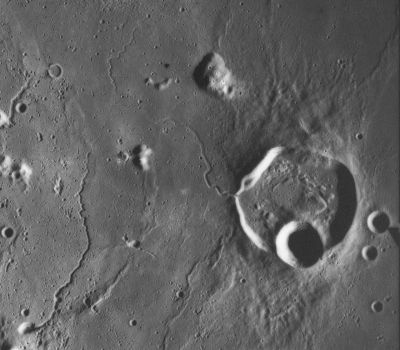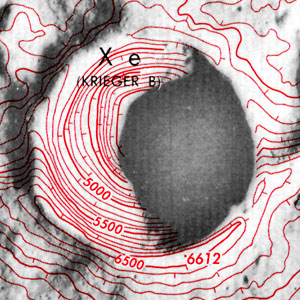Van Biesbroeck
Contents
[hide]Table of Contents
Van Biesbroeck
(formerly Krieger B)
|
Lat: 28.7°N, Long: 45.6°W, Diam: 9 km, Depth: 1.61 km,Rükl: 19 |

AS15-M2480, Krieger (large crater on right), Van Biesbroeck (on rim of Krieger) and Krieger Rille.
Images
LPOD Photo Gallery Lunar Orbiter Images Apollo Images
Maps
(LAC zone 39A1) LAC map Geologic map LM map LTO map Topophotomap
Description
Description: Wikipedia
Additional Information
- Depth data from Kurt Fisher database
- Westfall, 2000: 1.61 km
- Viscardy, 1985: 1.1 km
- Depth from Topophotomap 39A1S1 (1:50,000). Because Van Biesbroeck formed on the rim of Krieger, it's rim is very unequal in height. On the outer side of Krieger it rises 957 m higher than on the inside of the larger crater. The maximum height dropoff from the high point on the south to the lowest point on the floor is 2.47 km. The minimum drop (from the low point on the northwest rim) is about 1.52 km.
- Thermal anomaly crater, implying youthful age - Moore et al, 1980
Nomenclature
George A. Van Biesbroeck (1880-1974); Belgian-American astronomer.
Nomenclature trivia
Before being named "Van Biesbroeck" in 1976, the feature "Krieger B" was one of a handful to be subjected to provisional renaming according to a new scheme formally proposed in IAU Transactions XVB. The IAU felt there was an insufficient number of letters to designate each satellite feature that deserved naming, and according to this new scheme, each LTO "province" would be further subdivided into 24 rows and columns. Like some road maps, the columns would be designated by capital letters, running from left to right, and the rows by lower case letters, running from bottom to top. Under this scheme, since it is located near the lower right corner of LTO 39A1, Krieger B becomes "crater 39A1Xe", or, alternatively, after the name of the LTO province, "Krieger Xe". Hence on LTO 39A1, issued in July, 1973, the name "Krieger B" is indicated parenthetically as an obsolete name, to be replaced by the more modern designation "Xe". Although it has never been officially retracted, the new naming scheme never caught on, and such designations appear on only one or two other LTO charts. - JimMosher JimMosher
LPOD Articles
An invisible lava flow No Need to Draw Aperture
Bibliography
G. Van Biesbroeck in the Sourcebook Project:
- A Luminous Extension at the Terminator of Mars (Popular Astronomy, 1924), see: Mysterious Universe, a handbook of astronomical anomalies (William R. Corliss, The Sourcebook Project, 1979).
This page has been edited 1 times. The last modification was made by - tychocrater tychocrater on Jun 13, 2009 3:24 pm - afx4
